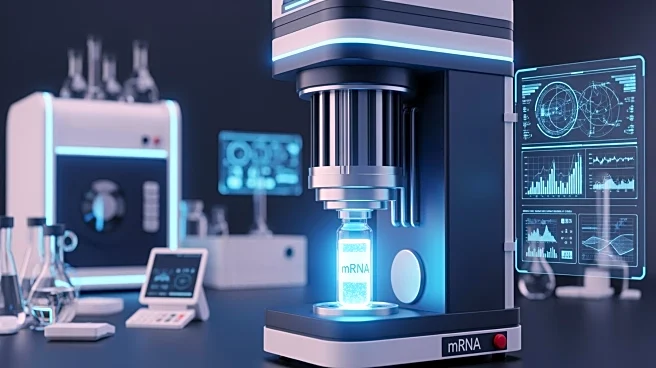What's Happening?
As mRNA-based therapeutics expand beyond COVID-19 vaccines, the industry faces new challenges in ensuring product purity and accurate quantitation. A recent webinar highlighted the need for evolving purification
and quantitation techniques to address impurities such as immunogenic double-stranded RNA (dsRNA) byproducts. These impurities complicate the manufacturing of mRNA, circRNA, and saRNA therapeutics. Traditional UV methods for nucleic acid quantitation, which require sample dilutions, are prone to inaccuracies. Experts from Rice University and Repligen discussed innovative solutions, including dsRNA-specific affinity chromatography and variable path length technology, to improve the manufacturing process.
Why It's Important?
The development of new purification and quantitation techniques is crucial for the advancement of mRNA therapeutics, which hold promise for treating a wide range of diseases. Ensuring the purity and accuracy of these products is essential for their safety and efficacy. The ability to remove dsRNA impurities and accurately measure mRNA concentrations can enhance the reliability of mRNA-based treatments, potentially leading to broader applications in medicine. This progress is particularly important as the industry seeks to build on the success of mRNA vaccines and explore new therapeutic modalities.
What's Next?
The industry is expected to continue refining purification and quantitation methods to meet the growing demand for mRNA therapeutics. Future developments may include the integration of advanced technologies into manufacturing processes to streamline production and improve product quality. As these techniques become more widely adopted, they could set new standards for the production of RNA-based therapeutics, influencing regulatory guidelines and industry practices. Ongoing research and collaboration among scientists and manufacturers will be key to overcoming current challenges and unlocking the full potential of mRNA technologies.
Beyond the Headlines
The focus on improving mRNA therapeutic manufacturing highlights the broader trend of innovation in biotechnology. As the field evolves, it may drive advancements in related areas such as gene editing and personalized medicine. The emphasis on purity and quantitation also reflects a growing awareness of the complexities involved in developing biologics, which require precise control over production processes. This shift towards more sophisticated manufacturing techniques could have long-term implications for the biotech industry, potentially leading to more effective and accessible treatments for a variety of conditions.










